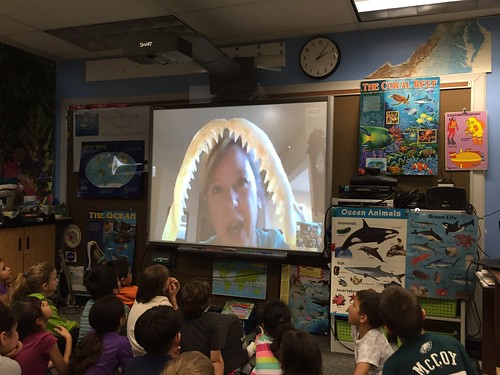Week Two in my ICT in Primary Education MOOC was entitled "How does ICT make a difference?". The first thing that was discussed (we read Chapter 6 of this UNESCO publication) was the fact that the introduction of ICT is creating a number of changes within schools:
- Changes in the teaching profession
- Teachers are collaborating more by sharing ideas, materials, projects, research and knowledge with each other. This is also happening at national and international levels.
- Technology is supporting teachers by helping them do things like find appropriate resources, prepare their lessons and update students' records.
- The ongoing developments in technology are making it essential that teachers in engage in lifelong learning.
- Some teachers are still resistant to technology.
- Changes in pedagogy
- ICT has encouraged teachers to implement more interactive, project-based and cross-curricular learning activities which increase students' engagement and motivation. It has also raised students' communication and research skills, as they learn to assess multiple sources of information, combine them, and present them in a coherent way.
- Technology is also providing students more opportunities to creatively express their ideas and learning.
- Teachers and students are increasingly able to use ICT to connect with others on a national and international level, bringing a wider perspective to their learning.
- Changes in learners
- Many students are extremely motivated by using ICT.
- ICT gives students instant feedback so enables them to work independently for longer periods of time.
- ICT encourages the important skills of communication, collaboration and problem-solving.
- Students can make mistakes more privately when they use technology.
- Students can use technology to help other students with their learning.
- When teachers are learning new technology skills they are modelling lifelong learning to their students.
- Change in administration
- ICT has made administration tasks more efficient.
A school in Brazil brought up the idea that with so much information available to students the role of the teacher changes, as they are asked questions they are not able to answer. They said, "Teachers can act like teachers (make questions, suggest guidelines, evaluate kids performance, help kids understand concepts, explain how to perform a specific procedure) while kids are using ICT, regardless of the teacher knowing or not knowing the details inside subject or topic that kids are learning" (pg.97). I think this is something that can make teachers feel uncomfortable, yet it is a natural consequence of moving towards project-based learning and emphasizing information literacy skills.
One school from the Slovak Republic mentioned they had a computer club for students who have no internet access at home (pg.94) . I think this is an interesting point - if we encourage students to explore resources and learn at home then we must have a plan in place to support those who are disadvantaged by lack of access.
Later in the chapter the researchers described some of the aspects around integrating ICT that teachers weren't expecting when they started the process. They were expecting that the transformation would take place more quickly than it did. They thought it would be easier to transform their traditional pedagogy to "harness the potential of ICTs" but this was not the case. It was also believed that new teacher graduates would bring with them digital skills and innovative ideas from their universities but that also has not happened. Finally, they weren't expecting that using technology to develop their own learning materials would be so time consuming.
I was interested in one of the case study videos in which a teacher from a school in the UK described having their Year 6 students create a world in Minecraft and then the Year 4 students were invited into that world and did writing about being in there. I think showcasing older students' work and using that to inspire younger students is a fantastic idea.
Beyond the School
Several websites were suggested for making national and international connections:
This is an area I would like our school to pursue more. Gaining a global perspective on different issues, through technology like Skype, is an amazing and exciting way to expand students' learning. The challenge I suppose is connecting with the right people at the right time.
Children's Perspectives
We finished up by having a look at how students perceive the use of ICT in their school (pg.101-111). Not surprisingly they are enthusiastic and motivated and think that technology is fun. They like creating, digital storytelling and communicating using ICT. I was interested that some students liked the support that word processing programmes gave them when they were writing - "You can have a go at spelling a word and MS word tells you if it’s wrong and it helps you learn spelling" (pg.104). I have a son who is equally keen to write using technology, and for much the same reason!
I am really enjoying this course so far. So much of what is discussed, in the forums and in the course videos and readings, is in line with my feelings and observations about ICT within my school. It is helping to clarify my opinions and also provide direction and pathways for the future.

Wow this is amazing, well done!!
ReplyDeleteBest School in Lucknow